"Ai-ya! What happened to your nose?"
She looks in the mirror. She sees nothing wrong. "What do you mean? Nothing happened," she says. "It's just the same nose."
"But how did you get it crooked?" I ask. One side of her nose is bending lower, dragging her cheek with it.
"What do you mean?" she asks. "It's your nose. You gave me this nose."
"How can that be? It's drooping. You must get plastic surgery and correct it."
But my daughter has no ears for my words. She puts her smiling face next to my worried one. "Don't be silly. Our nose isn't so bad," she says. "It makes us look devious." She looks pleased.
"What is this word, 'devious,' " I ask.
"It means we're looking one way, while following another. We're for one side and also the other. We mean what we say, but our intentions are different."
"People can see this in our face?"
My daughter laughs. "Well, not everything that we're thinking. They just know we're two-faced."
"This is good?"
"This is good if you get what you want."
I think about our two faces. I think about my intentions. Which one is American? Which one is Chinese? Which one is better? If you show one, you must always sacrifice the other.
It is like what happened when I went back to China last year, after I had not been there for almost forty years. I had taken off my fancy jewelry. I did not wear loud colors. I spoke their language. I used their local money. But still, they knew. They knew my face was not one hundred percent Chinese. They still charged me high foreign prices.
So now I think, What did I lose? What did I get back in return? I will ask my daughter what she thinks.
Jing-Mei Woo
The minute our train leaves the Hong Kong border and enters Shenzhen, China, I feel different. I can feel the skin on my forehead tingling, my blood rushing through a new course, my bones aching with a familiar old pain. And I think, My mother was right. I am becoming Chinese.
"Cannot be helped," my mother said when I was fifteen and had vigorously denied that I had any Chinese whatsoever below my skin. I was a sophomore at Galileo High in San Francisco, and all my Caucasian friends agreed: I was about as Chinese as they were. But my mother had studied at a famous nursing school in Shanghai, and she said she knew all about genetics. So there was no doubt in her mind, whether I agreed or not: Once you are born Chinese, you cannot help but feel and think Chinese.
"Someday you will see," said my mother. "It is in your blood, waiting to be let go."
And when she said this, I saw myself transforming like a werewolf, a mutant tag of DNA suddenly triggered, replicating itself insidiously into a syndrome , a cluster of telltale Chinese behaviors, all those things my mother did to embarrass me-haggling with store owners, pecking her mouth with a toothpick in public, being color-blind to the fact that lemon yellow and pale pink are not good combinations for winter clothes.
But today I realize I've never really known what it means to be Chinese. I am thirty-six years old. My mother is dead and I am on a train, carrying with me her dreams of coming home. I am going to China.
We are first going to Guangzhou, my seventy-two-year-old father, Canning Woo, and I, where we will visit his aunt, whom he has not seen since he was ten years old. And I don't know whether it's the prospect of seeing his aunt or if it's because he's back in China, but now he looks like he's a young boy, so innocent and happy I want to button his sweater and pat his head. We are sitting across from each other, separated by a little table with two cold cups of tea. For the first time I can ever remember, my father has tears in his eyes, and all he is seeing out the train window is a sectioned field of yellow, green, and brown, a narrow canal flanking the tracks, low rising hills, and three people in blue jackets riding an ox-driven cart on this early October morning. And I can't help myself. I also have misty eyes, as if I had seen this a long, long time ago, and had almost forgotten.
In less than three hours, we will be in Guangzhou, which my guidebook tells me is how one properly refers to Canton these days. It seems all the cities I have heard of, except Shanghai, have changed their spellings. I think they are saying China has changed in other ways as well. Chungking is Chongqing. And Kweilin is Guilin. I have looked these names up, because after we see my father's aunt in Guangzhou, we will catch a plane to Shanghai, where I will meet my two half-sisters for the first time.
They are my mother's twin daughters from her first marriage, little babies she was forced to abandon on a road as she was fleeing Kweilin for Chungking in 1944. That was all my mother had told me about these daughters, so they had remained babies in my mind, all these years, sitting on the side of a road, listening to bombs whistling in the distance while sucking their patient red thumbs.
And it was only this year that someone found them and wrote with this joyful news. A letter came from Shanghai, addressed to my mother. When I first heard about this, that they were alive, I imagined my identical sisters transforming from little babies into six-year-old girls. In my mind, they were seated next to each other at a table, taking turns with the fountain pen. One would write a neat row of characters: Dearest Mama. We are alive . She would brush back her wispy bangs and hand the other sister the pen, and she would write: Come get us. Please hurry .
Of course they could not know that my mother had died three months before, suddenly, when a blood vessel in her brain burst. One minute she was talking to my father, complaining about the tenants upstairs, scheming how to evict them under the pretense that relatives from China were moving in. The next minute she was holding her head, her eyes squeezed shut, groping for the sofa, and then crumpling softly to the floor with fluttering hands.
So my father had been the first one to open the letter, a long letter it turned out. And they did call her Mama. They said they always revered her as their true mother. They kept a framed picture of her. They told her about their life, from the time my mother last saw them on the road leaving Kweilin to when they were finally found.
And the letter had broken my father's heart so much-these daughters calling my mother from another life he never knew-that he gave the letter to my mother's old friend Auntie Lindo and asked her to write back and tell my sisters, in the gentlest way possible, that my mother was dead.
But instead Auntie Lindo took the letter to the Joy Luck Club and discussed with Auntie Ying and Auntie An-mei what should be done, because they had known for many years about my mother's search for her twin daughters, her endless hope. Auntie Lindo and the others cried over this double tragedy, of losing my mother three months before, and now again. And so they couldn't help but think of some miracle, some possible way of reviving her from the dead, so my mother could fulfill her dream.
So this is what they wrote to my sisters in Shanghai: "Dearest Daughters, I too have never forgotten you in my memory or in my heart. I never gave up hope that we would see each other again in a joyous reunion. I am only sorry it has been too long. I want to tell you everything about my life since I last saw you. I want to tell you this when our family comes to see you in China…" They signed it with my mother's name.
It wasn't until all this had been done that they first told me about my sisters, the letter they received, the one they wrote back.
"They'll think she's coming, then," I murmured. And I had imagined my sisters now being ten or eleven, jumping up and down, holding hands, their pigtails bouncing, excited that their mother- their mother-was coming, whereas my mother was dead.
Читать дальше












